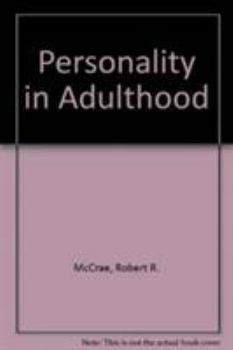Personality in Adulthood
Select Format
Select Condition 
Book Overview
This influential work examines how enduring dispositions or traits affect the process of aging and shape each individual's life course. From two well-known authorities in the field, the volume is... This description may be from another edition of this product.
Format:Hardcover
Language:English
ISBN:0898624290
ISBN13:9780898624298
Release Date:May 1990
Publisher:Guilford Publications
Length:198 Pages
Weight:0.80 lbs.
Customer Reviews
1 rating
Good introduction to the `Big 5' model and personality development
Published by Thriftbooks.com User , 19 years ago
Chapter 1 describes the well-known `Five Factor Model' (FFM) of personality traits and the robust result that in most people, personality changes little after the age of 30. Other theories of adulthood in the work of Freud, Jung, Erikson and others are also reviewed. Chapter 2 is an interesting tutorial on the trait approach to personality, which the authors did so much to develop and popularise. Chapter 3 continues the theme by outlining the issues involved in measuring personality traits (self-report questionnaires vs. reports from other people, for example). Chapter 4 notes that the time period of study for personality change through aging is many decades, so whether the object of study is a multi-aged sample from the whole population, or whether a defined group is followed-up through the years and decades, there are significant problems in identifying real (and individual-level) phenomena. Chapter 5 explores aging and personality change across different cultures - are there universal principles, or is personality development culture-specific? The authors argue that the evidence firmly supports the former. Chapters 6-9 look at personality development in the individual, review various hypotheses and outline the evidence for stability. The psychoanalytic tradition comes in for some rough handling here. Interestingly, the popular concept of `mid-life crisis' is shown to be a myth. Chapter 6, incidentally, perpetuates an astonishing misconception of Jungian type development (p.105). Jung is said to have hypothesised that in the course of adult psychological development, early psychological traits would be replaced by their opposite: e.g. introverts would later become extraverts. The correct Jungian proposition is one of development of auxiliary, tertiary and inferior functions into fuller consciousness, and a rounding of the personality, not its inversion! One feels perhaps a defensive reaction on the part of the authors here! Chapter 10 describes a proposal to extend the FFM of personality traits to a full personality model. This involves introducing new entities (p. 188) such as biological bases (the physical body), the FFM traits themselves- called `basic tendencies', characteristic adaptations, a self concept, objective biography and the impact of external influences. While the FFM is clearly incomplete, the proposal here seems less than compelling. There are many ways, in the absence of hard brain architecture evidence, to speculatively decompose the functional underpinnings of human personality, and the authors' model seems to give little weight to subconscious processes. The book ends with a number of interesting discussions on the impact of personality on marriage, divorce and career - material heavily covered in the `psychological type' literature (Keirsey, Myers-Briggs, etc). The authors also discuss the `psychological profiling' of historical individuals based on biographical information. In their concluding remarks, the auth






